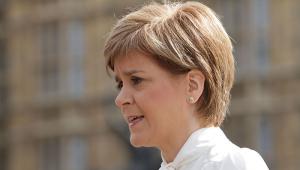The report, published in May, said an independent Scotland should seek to emulate the success of other small countries such as Denmark, Finland and New Zealand, and keep the pound until six key economic tests were met.
However, its commitment to limit overall spending increases to 0.5% a year against the backdrop of an ageing population led the Institute for Fiscal Studies to warn that Scotland would face another decade of austerity under the proposals, with expenditure on public services and benefits falling by 4% of GDP over the course of a decade.
In the wake of the latest Government Expenditure and Revenue Scotland figures, the IFS said reliance on a strong rebound in oil revenues would be a gamble, and welcomed the commission’s emphasis on boosting productivity instead.
The commission’s analysis was dismissed as “highly misleading” by the pro-union These Islands think-tank, which said that had the commission’s fiscal rules had been applied retrospectively, public spending in Scotland would have been up to £66bn lower over the past decade – strengthening the case for Scotland to remain in the UK.
However, according to economist John McLaren, Scottish independence could provide opportunities for a radical programme of tax and spend adjustments to address the fiscal deficit so avoiding extended austerity.
Otherwise, if Scotland struck a deal with the rest of the UK over North Sea oil revenues and shared debt – as proposed by the commission – it would face a difficult transition period then a gamble over its future prosperity.
“It is effectively a form of austerity and, when you come out the other side of it, nothing is guaranteed, which is quite a difficult sell unless you want independence regardless,” McLaren told PF.
Rather than phasing changes in gradually over 10 years, he argued, Scotland could bring them in upfront.
Among his proposals to raise revenue are the introduction of a subsidised fee for basic healthcare services as well as increases in income tax and VAT.
New taxes should also be considered, he said, with a tax on whisky especially attractive, as Scotch manufacturers have to be based in Scotland.
An overhaul of taxation would be more palatable at the point of independence than five years afterwards, at which point expectations would already be set, he said.
On the expenditure side, he suggested cutting university degrees from four years to two or three alongside a substantial reduction in economic development and defence spending.
The commission’s proposals may be easier to sell in the context of Brexit, which Scotland firmly rejected.
However, the commission itself largely ignores the economic implications of Scotland leaving the UK single market, said McLaren.
“The similarity between Brexit and Scottish independence is striking, and yet the report doesn’t address that at all,” he said.
On the currency is, he noted that the possibility of an independent Scotland joining the euro was also neglected by the commission. While the euro’s prospects looked poor around the time of the Greek crisis, he said, they now appeared much stronger, although basic flaws still existed.
One of these – sharing a monetary policy framework without a shared fiscal framework – would rear its head if sterling were to be kept, while a Scottish currency would need substantial reserves to protect it. Within the eurozone, Scotland would at least benefit from the defence mechanisms of the EU central banking system.
“If the UK leaves the EU but Scotland still wants to have strong connections with, or stay in, the EU, it would make sense to join the euro,” McLaren said.











